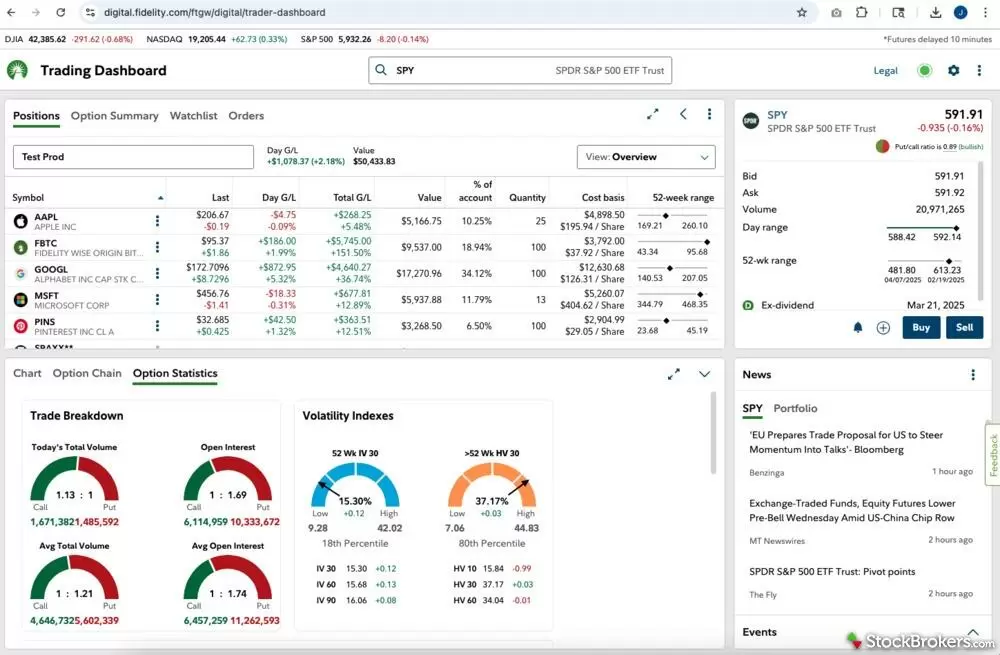Winners Summary
Best broker for Roth IRAs - Fidelity
| Company |
Overall |
Roth IRAs |
Traditional IRAs |
IRA Annual Fee |
 Fidelity IRA Fidelity IRA
|
 |
Yes |
Yes |
$0.00 |
Why we chose Fidelity: When it comes to Roth IRAs, Fidelity stands out for its unbeatable combination of low fees, top-notch investment options, and stellar customer service. I’ve evaluated many brokers, and Fidelity’s unique offerings consistently make it a top choice for retirement savers who value cost efficiency, investment flexibility, and comprehensive support.
Fidelity Roth IRA Highlights:
- Low Fees That Maximize Growth: Fidelity’s ZERO index mutual funds — offering 0% management fees and no minimum investment requirement — are unrivaled, even by industry giant Vanguard. With $0 account minimums and no IRA maintenance fees, you can start building a diversified portfolio without worrying about hidden costs eating into your returns. Fidelity’s commission-free trades on stocks and ETFs only sweeten the deal, though if you have your sights set on a specific mutual fund, make sure it’s on Fidelity’s list of no-transaction-fee funds, or you risk paying a $49.95 fee to buy that fund.
- Comprehensive Investment Options: From its exclusive ZERO funds to fractional share investing through "Stocks by the Slice," Fidelity ensures that investors of all levels can tailor a portfolio to their needs. For those looking to balance risk and growth, the ability to invest in bonds, U.S. Treasuries, and even crypto-related ETFs ensures no corner of the market is off-limits.
- Unparalleled Customer Support and Tools: Fidelity sets the gold standard for customer service in the IRA space. Their specialists are available by phone, chat, and even Reddit, offering personalized assistance for everything from Roth IRA conversions to rollovers. Add in powerful tools like the Fidelity Retirement Score and a robust rollover support system, and it’s clear why Fidelity is a top choice for retirement savers.
With its unbeatable fees, expansive investment options, and exceptional support, Fidelity has earned its reputation as the best broker for Roth IRAs. Read my Fidelity IRA review to learn more.
Best Roth IRA for active traders - Charles Schwab
| Company |
Overall |
Roth IRAs |
Traditional IRAs |
IRA Annual Fee |
 Charles Schwab IRA Charles Schwab IRA
|
 |
Yes |
Yes |
$0.00 |
Why we chose Charles Schwab: When it comes to active trading within a Roth IRA, Charles Schwab stands out for its robust trading tools, low fees, and comprehensive customer support.
Charles Schwab Roth IRA Highlights:
- An advanced platform: Schwab’s trading platform, thinkorswim, is tailored to experienced investors who thrive on real-time data, customizable dashboards, and seamless trade execution. For those diving into ETFs, options, or a diverse range of investments, Schwab offers a wide selection without trade commissions, making it a cost-effective choice. Personally, I’ve found Schwab’s platform intuitive, with just enough advanced features to cater to the most ambitious traders while remaining accessible to beginners.
- Pricing: Roth IRA investors will appreciate the lack of account minimums and the competitive pricing on its proprietary mutual funds, many of which have no transaction fees. While there’s a hefty $74.95 fee for certain third-party mutual funds, Schwab provides thousands of no-transaction-fee alternatives, including its highly-rated OneSource funds. For ETF enthusiasts like myself, Schwab’s lineup includes ultra-low-cost index ETFs such as Schwab’s S&P 500 index fund (SWPPX) and its Total Stock Market index fund (SWTSX).
- Customer service and planning tools: From 24/7 phone support to its retirement calculators and income planning tools, Schwab makes it easy to strategize for long-term goals. I’ve personally tested its Roth vs. Traditional IRA calculator and appreciated its nuanced approach, though it could be streamlined for better usability. Whether you’re rolling over an IRA or building a new one from scratch, Schwab’s detailed guides and on-call assistance ensure you’ll never feel lost. For active traders looking for flexibility and depth, Schwab remains a top pick.
Check out my Charles Schwab IRA review for more details.
» If you’re an active trader, read our full Charles Schwab review for a full rundown of the broker’s trading tools.
Best Roth IRA withdrawal options - E*TRADE from Morgan Stanley
| Company |
Overall |
Roth IRAs |
Traditional IRAs |
IRA Annual Fee |
 E*TRADE IRA E*TRADE IRA
|
 |
Yes |
Yes |
$0.00 |
Why we chose E*TRADE: E*TRADE's main differentiator is its Complete IRA, a unique account tailored to simplify retirement withdrawals, making it one of the best options for Roth IRA holders nearing retirement. Designed for those aged 59½ and older, the Complete IRA allows penalty-free access to your funds through flexible options such as debit cards, electronic payments, and checks. This eliminates the delays common with traditional IRA withdrawals, giving retirees near-instant access to their money. E*TRADE also streamlines tax reporting with auto-generated IRS Form 1099-R, easing the burden of managing distributions come tax season.
- Planning tools: E*TRADE’s retirement calculator is one of the most detailed in the industry, allowing young investors to model future income needs, account for multiple income sources, and adjust inputs for a clear retirement roadmap. DIY investors will appreciate the Power E*TRADE platform, which supports comprehensive research and trading capabilities, while semi-DIYers can use prebuilt portfolios to create diversified investment strategies with ease. This balance between powerful tools and accessible features makes E*TRADE ideal for hands-on savers preparing for their golden years.
- Excellent value: While E*TRADE’s Complete IRA caters to retirees, its overall Roth IRA offering provides excellent value for all investors. With no trading commissions and minimal fees, your money stays in your portfolio, not your broker’s pocket. Even mutual fund trades are fee-free, an advantage for long-term investors building diversified portfolios. While the lack of fractional shares and fully integrated financial planning may deter some, E*TRADE remains a top choice for anyone who values flexibility, low fees, and user-friendly tools in managing their Roth IRA.
Learn more by reading my E*TRADE IRA review.
Best Roth IRA for automated investing - Interactive Brokers
Why we chose Interactive Brokers: Interactive Brokers (IBKR) is my top pick for automated investing within a Roth IRA, thanks to its ultra-low fees, customizable robo-advisor options, and sophisticated tools. With no account maintenance fees and $0 trading costs for U.S. stocks and ETFs, IBKR makes it easy to maximize your contributions. Its retirement accounts include the essentials like traditional, Roth, and rollover IRAs, while the powerful Retirement Planner tool provides a comprehensive roadmap for your financial future. Linking external accounts ensures you get a complete picture of your finances, but you might need to spend a little extra time inputting details to make the most of it.
- Robo-advising: The Interactive Advisors robo-advisor offers an excellent solution for hands-off investors. With a $100 minimum and an ultra-low 0.20% management fee, you’ll access diversified portfolios that include inflation hedging strategies. Unlike many robo-advisors, IBKR lets you tweak your portfolio, adding eco-friendly ETFs or adjusting your stock allocation. This level of customization is rare and lets you align investments with your goals and values.
- Portfolio management: For those seeking sophisticated portfolio management, IBKR’s Client Portal and PortfolioAnalyst serve their purpose well. The former simplifies account navigation, even for newer investors, while PortfolioAnalyst offers advanced insights, including benchmarking and diversification analysis. You can trade fractional shares of all U.S. stocks and ETFs, ensuring every dollar is put to work. While IBKR’s active trader heritage means the platform may initially feel complex, the low costs and robust tools make it a compelling choice for Roth IRA investors aiming to automate and optimize their retirement savings.
For a deeper dive on its full IRA offerings, check out by full review of Interative Brokers' IRAs.
Roth IRA account fees comparison
|
Feature |
 Fidelity IRA Fidelity IRA
|
 Charles Schwab IRA Charles Schwab IRA
|
 E*TRADE IRA E*TRADE IRA
|
 Interactive Brokers IRA Interactive Brokers IRA
|
 Merrill Edge IRA Merrill Edge IRA
|
|
IRA Annual Fee
info
|
$0.00
|
$0.00
|
$0.00
|
$0.00
|
$0.00
|
|
IRA Closure Fee
info
|
$0.00
|
$0.00
|
$0.00
|
$0.00
|
$49.95
|
|
Account Transfer Out (Full)
info
|
$0.00
|
$50.00
|
$75.00
|
$0.00
|
$0.00
|
|
Account Transfer Out (Partial)
info
|
$0.00
|
$0.00
|
$0.00
|
$0.00
|
$0.00
|
|
Stock Trades
info
|
$0.00
|
$0.00
|
$0.00
|
$0.00
|
$0.00
|
|
Mutual Fund Trade Fee
info
|
Varies
info |
Varies
info |
$0.00
|
Varies
info |
Varies
info |
|
Broker Assisted Trade Fee
info
|
32.95
|
$25
|
$25
|
$30
|
$29.95
|
FAQs
What is a Roth IRA?
A Roth IRA is a tax-advantaged retirement account. When you open a Roth IRA and contribute money to it, the money in that account grows tax-free (assuming you follow all the rules). After you turn 59½, you can withdraw your money, including any investment gains, without owing any taxes. That’s a sweet and valuable perk once you’re in retirement.
If you’ve got many years until retirement, it's usually wise to invest the money in your Roth IRA in a diversified portfolio of stocks and bonds. Here’s more on what an IRA is, how to open a Roth IRA, and how to invest for retirement.
What is the 2025 contribution limit for a Roth IRA?
The 2025 IRA contribution limit is $7,000 if you’re under age 50, and $8,000 for those 50 and older. The limit is set by the IRS and applies to the total annual amount of new money an investor is allowed to contribute to traditional and Roth IRAs at any broker. If you invest in both a traditional and a Roth IRA in the same year, the total of your combined contributions still may not exceed that $7,000/$8,000 limit. (IRA rollovers and IRA-to-Roth conversions aren’t subject to these contribution limits.) See “What is an IRA?” for more on IRA contribution and withdrawal rules for 2025.
What are the advantages of a Roth IRA vs. a traditional IRA?
The big advantage of a Roth IRA over a traditional IRA is that once you retire, all of your money, including your investment earnings, comes out tax-free. That’s a nice perk when you’re on a limited income in retirement and hoping to keep as much as your savings for yourself, rather than handing it over to the IRS.
Two other Roth IRA advantages:
- If you run into a money emergency, you can always withdraw your contributions at any time, no taxes or penalties (with a traditional IRA, early withdrawals generally come with income tax plus a 10% penalty).
- There are no required minimum distributions, so you can choose when to withdraw from your Roth, unlike a traditional IRA, from which you’re required to take distributions once you reach age 73.
But hold on. The traditional IRA has its own advantages: The money you put into a traditional IRA is pre-tax (if you qualify for deductible contributions). Put another way, your traditional IRA contributions reduce your taxable income in the year you make the contribution. That can help boost how much you save. (In retirement, you pay income tax on the money you withdraw from your IRA.)
Plus, your investments grow tax-deferred — no tax due till you withdraw the money — and if your tax rate is higher now than it will be in retirement, then avoiding tax on your contribution dollars now, with a traditional IRA, will lower your lifetime tax bill.
If you’re having trouble picking between a Roth IRA and a traditional IRA, you could always choose to contribute to both. Just remember that the annual maximum you can put in both accounts put together is $7,000 in 2025, or $8,000 if you’re 50+.
Read more about Roth IRAs vs. traditional IRAs, including contribution limits and eligibility rules.
Are Roth IRA contributions tax deductible?
Roth IRA contributions are not tax deductible. The money you contribute to a Roth is money that will be counted as part of your income in the year you make the contribution. That is, you earn your money for the year and report it, as usual, on your tax return. Meanwhile, you make your Roth IRA contribution(s), without any tax effect.
The beauty of a Roth is that, once you put your money in, and assuming you let it grow till you’re at least 59½ years old, then all of your money comes out entirely tax-free, including whatever investment returns you earned in the account. That’s a compelling perk.
When can you withdraw from a Roth IRA?
You can withdraw your Roth IRA contributions any time you want, no penalty, no taxes. Say you contributed money to a Roth IRA yesterday? That money you contributed can be taken out of your account today, without taxes or penalty.
The sticky part is if you want to withdraw your investment earnings. That money will be subject to income taxes and a 10% early withdrawal penalty if you take it out before you’re age 59½. There are some exceptions to the penalty — check out the Roth IRA early withdrawal exceptions on IRS.gov.
Can you have multiple Roth IRAs?
Yes, you can have multiple Roth IRAs. Just know that the annual contribution maximum (which is $7,000 in 2025, plus an extra $1,000 if you’re 50 or older), applies to your contributions to all Roth accounts, totaled up. You can contribute that annual maximum spread out across one Roth or three or 100, but don’t exceed that dollar cap.
Keep in mind that the annual maximum dollar amount applies to money you’re contributing to a Roth IRA. If you’re rolling money into an IRA, or converting a traditional IRA to a Roth IRA, the annual maximum contribution amount doesn’t apply.
Can you have a Roth IRA and a 401(k)?
Yes, you absolutely can (and perhaps should) have both a Roth IRA and a 401(k). There’s no limitation on having both. You can contribute the maximum amount to a 401(k), aka $23,500 in 2025, plus an additional $7,500 if you’re 50+, and at the same time you can contribute the maximum to a Roth IRA, i.e., $7,000 in 2025, plus an extra $1,000 if you’re 50+.
Even if your 401(k) offers a Roth option, you can contribute the maximum 401(k) amount to that Roth option, and contribute the maximum to your Roth IRA.
Our testing
Why you should trust us
Andrea Coombes, a former senior writer for StockBrokers.com and AdvisorSearch.org (formerly investor.com), has more than 20 years of experience researching, writing and teaching about personal finance, with a focus on retirement planning. A former financial coach and Certified Financial Planner, Andrea manages her own retirement portfolio (a couple of 401(k)s, a rollover IRA, Roth IRA, SEP IRA, HSA and brokerage account), with the bulk of her retirement assets focused on the Lazy Portfolio strategy for retirement investing.
Blain Reinkensmeyer, co-founder of StockBrokers.com, has been investing and trading for over 25 years. After having placed over 2,000 trades in his late teens and early 20s, he became one of the first in digital media to review online brokerages. Blain created the original scoring rubrics for StockBrokers.com and oversees all testing and rating methodologies.
How we tested
- We used our own brokerage accounts for testing.
- We collected multiple data points for each broker.
- We tested each online broker's website and mobile app, where applicable.
- We maintained strict editorial independence; brokers cannot pay for inclusion or a higher rating.
Our research team meticulously collected data on features with particular importance to those saving for retirement, such as trading costs, management fees, availability of fee-free funds, ease of website and app use, and retirement planning tools and resources.
At StockBrokers.com, our reviewers use a variety of computing devices to evaluate platforms and tools. Our reviews and data collection were conducted using the following devices: iPhone SE running iOS 17.5.1, MacBook Pro M1 with 8 GB RAM running the current MacOS, and a Dell Vostro 5402 laptop i5 with 8 GB RAM running Windows 11 Pro.
Each broker was evaluated and scored in seven key categories: retirement account types, IRA fees, self-directed investment options, managed investment options, retirement planning tools, rollover experience, and ease of use.

 Fidelity IRA
Fidelity IRA




 Charles Schwab IRA
Charles Schwab IRA




 E*TRADE IRA
E*TRADE IRA




 Interactive Brokers IRA
Interactive Brokers IRA





 Merrill Edge IRA
Merrill Edge IRA


